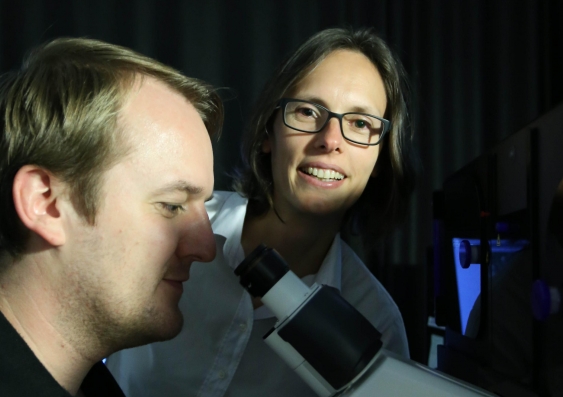UNSW home to prestigious new European lab
UNSW is to be the home of a new laboratory set up by Europe’s flagship life sciences institute with the aim of transforming medicine at the molecular level.
UNSW is to be the home of a new laboratory set up by Europe’s flagship life sciences institute with the aim of transforming medicine at the molecular level.

Europe’s flagship life sciences institute will open a new molecular laboratory at UNSW’s Lowy Cancer Research Centre, where a new generation of super-resolution microscopes is being used to unravel some of medicine’s fundamental mysteries.
The Australian government joined the prestigious European Molecular Biology Laboratory (EMBL) in 2008, and EMBL Australia has announced that it will open a new node at the Lowy Cancer Research Centre – the UNSW Centre in Single Molecule Science.
The Centre will be part of UNSW’s Single Molecule Science initiative led by Professor Katharina Gaus, an NHMRC Senior Research Fellow and deputy director of the recently funded ARC Centre of Excellence in Advanced Molecular Imaging.
Professor Gaus won an Elizabeth Blackburn Fellowship this year from the NHMRC for her work using super-resolution microscopes to image molecular signalling in live T-cells. The next-generation technology can zoom down to a resolution 700 times smaller than a red blood cell.
“UNSW’s strong culture of research collaboration and excellence fits well with the vision and culture of both EMBL Australia and EMBL internationally,” says UNSW’s Deputy Vice-Chancellor (Research) Professor Les Field.
“The cross-disciplinary environment at the Lowy Cancer Research Centre will provide state-of-the-art laboratory space and access to platform technologies for the new EMBL Australia groups.”
The new EMBL node will have a multidisciplinary focus, uniting biophysics, biochemistry, and cell biology with nanotechnology and fabrication, hoping to transform medicine through molecular perspectives. Recruitment for Centre leaders will commence later this year.
- by Amy Coopes
Media contact: Steve Offner, UNSW Media, 02 9385 1583, 0424 580 208